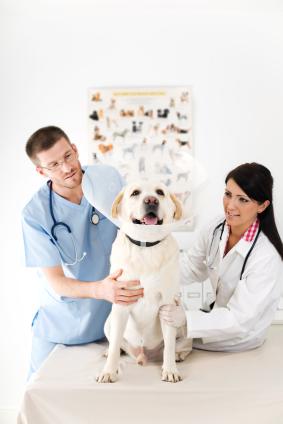
There are a number of ways you can clean your dog’s teeth, including dental bones, sprays, teeth brushing and professional cleaning. Ideally, a dog’s teeth should be cleaned every other day or every week. However, cleaning his teeth can be time consuming and even a little hard to accomplish.
Dog teeth cleaning is something that is often overlooked, which can lead to teeth and oral problems for your dog. Oral care is just as important for a dog as grooming his fur or clipping his nails. It may be a bit of a chore to get used to, but the benefits will pay off in the long run.
Just as with humans, it is recommended dogs get a routine teeth cleaning done professionally. Having your dog’s teeth cleaned professionally before attempting to clean them yourself is beneficial for a number of reasons.
Benefits of professional cleaning
Removal of tartar – Tartar is easily formed around the teeth. All it takes is a few days without teeth cleaning for tartar to build up and harden on the teeth. Tartar is caused mostly by plaque deposits. If plaque is not removed, it will turn into tartar, and tartar can only be removed by a professional.
Whiter teeth and fresh breath – A professional dog teeth cleaning will help to polish the teeth and rid them of any tartar deposits, which will help give your dog whiter teeth. Bacteria build up can cause bath breath. A thorough cleaning from a pet dental hygienist will help to remove any bacteria causing build ups in your dog’s gums and teeth.
Preventing disease – Tartar and plaque build up can lead to gum disease or gingivitis. If left untreated for too long, it can cause serious problems such as periodontal disease, teeth loss and teeth chattering. Bacteria build up can enter the bloodstream and eventually cause heart, liver and kidney problems.
Early detection of dental problems – A pet dental hygienist will inspect the teeth, gums and mouth of your dog during a professional cleaning session. Dental problems can be detected right away and treated to a void any serious pain or health problems in the future.
Risks of professional cleaning
Just as with any surgery involving anesthesia, there are always going to be some minor risks involved with having your dog’s teeth cleaned professionally. Most risks can be avoided with proper education on how to clean your dog’s teeth and best practices to use in between veterinarian visits. Even though it is not likely anything serious will happen during a routine cleaning, it is important to understand the risks and process involved during a cleaning.
Anesthesia – The highest risk involving teeth cleaning is the use of anesthesia. Although there are a number of safe anesthetic procedures available, there are always complications that may occur during the procedure. Your veterinarian will perform a blood test to ensure your dog can safely handle anesthesia.
Allergic reaction – Another possible risk is allergic reaction to the anesthesia, products used to clean or latex gloves used during the cleaning. It is not common, but still possible. If a dog’s temperature elevates rapidly and the heart rate is increased, medication may be given to prevent the throat from swelling and prevent cardiac arrest.
Side effects – There are some mild side effects from anesthesia that may occur after the procedure is done. These include teeth damage or bleeding gums, nausea, dizziness and vomiting or damage to oral tissue.
As always, you should always talk to your veterinarian if you have any concerns about cleaning your dog’s teeth at home or professionally. He will give you the best tips for your dog’s oral health and safety.
For more information about cleaning and caring for your dog’s teeth, visit www.dogteethhelp.com
